On April 28, 2017, INESS in cooperation with Austrian Economics Center organized in Slovakia Free Market Road Show, a part of a series of conferences and panel discussions that tours all over Europe – from Scandinavia to Montenegro, from Spain to Ukraine. Over 400 experts participate overall, presenting aspects of key economic questions in 45 cities, involving the audience in a vital discussion on economic and public policy questions. The event in Bratislava has now become a tradition, with one of the highest turnouts. This year’s topic of th event was “The World after Brexit and Trump”.
Approximately a hundred participants from various backgrounds and professions gathered at Hotel Tatra. Richard Ďurana (Director of INESS) opened the conference with a few organizational remarks, then gave the floor to the first discussion panel chair, Lukáš Krivošík (editor, týždeň weekly).
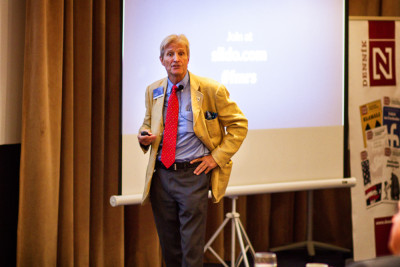 Dr. Christopher Lingle was the first speaker. He talked mainly about Brexit and Donald Trump’s victory in the U.S. presidential election. Dr.Lingle considers both of these events to be the manifestation of people’s revolt against the political elites which are making use of the opportunity to implement the rules according to their liking, and not for the benefit of the common people. He criticized the proposals of social democrats as they do not bring about the improved economic prosperity of the citizens. Dr. Lingle sees Brexit as a powerful sign that the public wants to have more say in the decision-making processes.
Dr. Christopher Lingle was the first speaker. He talked mainly about Brexit and Donald Trump’s victory in the U.S. presidential election. Dr.Lingle considers both of these events to be the manifestation of people’s revolt against the political elites which are making use of the opportunity to implement the rules according to their liking, and not for the benefit of the common people. He criticized the proposals of social democrats as they do not bring about the improved economic prosperity of the citizens. Dr. Lingle sees Brexit as a powerful sign that the public wants to have more say in the decision-making processes.
Dr. Lingle was followed by the second speaker, Dr. Robert Murphy (Texas Tech University). Dr. Murphy spoke about taxation and harmful state subventions in economics. He also criticized the way in which international companies are taxed, as it is the main cause of rising prices for the end customers. Dr. Murphy further emphasized that excess taxation halts prosperity.
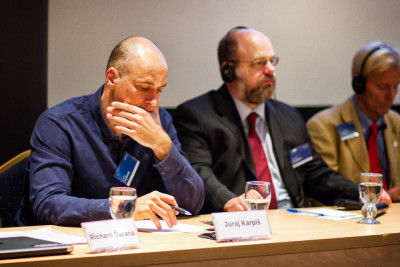 Furthermore, Juraj Karpiš (INESS) was talking about the risks of abolishing cash under the veil of security measures. Mr. Karpiš labeled limiting the use of cash as a protectionist tool, mentioning a number of examples from around the world, where there was imposed a limit on handling cash above a certain threshold (including Slovakia), not omitting the impact these limitations have. He also added that countries with no such limits do not have issues with higher crime rates than those with such constraints, as lowering the crime rates is one of the arguments governments use when implementing these regulations.
Furthermore, Juraj Karpiš (INESS) was talking about the risks of abolishing cash under the veil of security measures. Mr. Karpiš labeled limiting the use of cash as a protectionist tool, mentioning a number of examples from around the world, where there was imposed a limit on handling cash above a certain threshold (including Slovakia), not omitting the impact these limitations have. He also added that countries with no such limits do not have issues with higher crime rates than those with such constraints, as lowering the crime rates is one of the arguments governments use when implementing these regulations.
The fourth speaker was Mr. Michael Jäger (Taxpayers Association of Europe and Bavarian Taxpayers Association), who circled back to the topic of taxation. Mr. Jäger warned against the implementation of a fiscal union which would impose unitary tax in all of the EU countries. He highlighted the advantages of tax competition, which maintains the pressure to improve the taxation policies of individual countries, adding that this competition is one of the most important features of free trade, along with including the public in the debate and informing it about the progress.
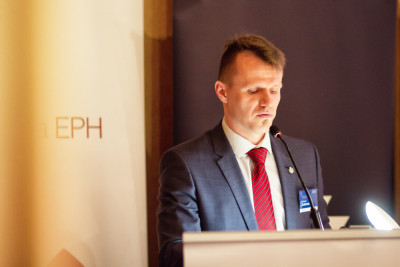 Richard Ďurana (INESS) closed the first panel with his contribution, focusing on intellectual property rights. Patents and their protection was previously introduced with the aim of fostering innovation and competition. However, as Dr. Ďurana explained, the current system of patent protection creates an impulse for rather monopoly creation than innovations. Furthermore, he pointed out the phenomenon of attributing certain inventions to specific people, when it is known that several people in different parts of the world have “discovered” the same thing. Dr. Ďurana also mentioned the phenomenon of the so-called patent-wars, where companies are more likely to invest in winning the court cases than to bring forth new innovations, as well as patent trolling with serious economic damages for the economy.
Richard Ďurana (INESS) closed the first panel with his contribution, focusing on intellectual property rights. Patents and their protection was previously introduced with the aim of fostering innovation and competition. However, as Dr. Ďurana explained, the current system of patent protection creates an impulse for rather monopoly creation than innovations. Furthermore, he pointed out the phenomenon of attributing certain inventions to specific people, when it is known that several people in different parts of the world have “discovered” the same thing. Dr. Ďurana also mentioned the phenomenon of the so-called patent-wars, where companies are more likely to invest in winning the court cases than to bring forth new innovations, as well as patent trolling with serious economic damages for the economy.
The first Q&A session covered quite a wide spectrum. First, there was the topic of state intervention in the name of local producers’ protection. Dr. Lingle added that while protecting the producers rather than customers, we give more attention to protecting the supply than the demand and in fact, the golden rule of “customer-first” is forgotten.
Michael Jäger‘s answer to the question whether free trade and customs union benefit the free market was that these have now become obsolete and, in fact, can impede the trade rather than support it. If the states limit the flow of goods and services beyond the artificial borders, they practically discriminate against the customers there.
Another question from the audience focused on the necessity of patent protection for expansion of businesses. Richard Ďurana replied with a few examples of IT companies which buy out patents, thus strengthening their own position on the market and halting the research efforts of smaller companies.
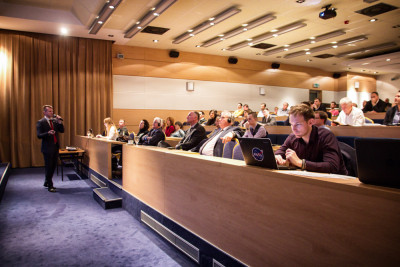 Next question was about the relationship between Euro, crypto-currencies, and their relation to the market. Juraj Karpiš noted that occurrence of crypto-currencies can be understood as a manifestation of people’s lack of trust for standard currencies. Further question directed at Mr. Karpiš focused on the advantages of cash, to which he replied by saying that cash means alertness, and having cash at one’s disposal provides them with many more opportunities in comparison to storing all of one’s money in the bank.
Next question was about the relationship between Euro, crypto-currencies, and their relation to the market. Juraj Karpiš noted that occurrence of crypto-currencies can be understood as a manifestation of people’s lack of trust for standard currencies. Further question directed at Mr. Karpiš focused on the advantages of cash, to which he replied by saying that cash means alertness, and having cash at one’s disposal provides them with many more opportunities in comparison to storing all of one’s money in the bank.
Peter Bárdy, Editor-in-Chief of the internet portal Aktuality.sk, opened the second discussion panel entitled “Troubled Times in a Divided World”. Prof. Erich Weede, who specializes in psychology and political science, mentioned in his speech a significant weakening of original Western values – economic freedom being one of them. He contended that we are now facing stronger state influence, and ever-stronger income redistribution, which then subsequently feeds conflicts. Prof. Weede also mentioned EU sanctions against Russia, which he deemed inefficient and claimed that they will only contribute to strengthening the trade ties between Russia and China.
The second speaker in this panel was Mr. Eugen Jurzyca (Slovak MP for SaS – Freedom and Solidarity). Mr. Jurzyca talked about the necessity of improvement of the decision-making quality control on the European level, e.g. Juncker’s European Fund for Strategic Investments (EFSI). It has not been validated by the European court of auditors (ECA), but it has been implemented, aiming to support the economy using the multiplier effect of invested resources. Mr. Jurzyca criticized the “the more investment, the better” approach, and supported enhanced control of these mechanisms. He also highlighted another issue – the inconsistency of EU objectives (such as supporting environmental efforts while financing projects harmful for the environment).
The next speaker in the second panel was Ivan Štefunko (Progressive Slovakia). Mr. Štefunko emphasized that the political decision making needs to reflect the economic reality more thoroughly than it does at the moment. He mentioned the issues of Slovak labor market, as well as the infamous brain-drain of young people in our country. The key to prosperity, he claims, is to allow for more flexibility in the labor law, and to maintain the free movement of labor. Apart from that, Mr. Štefunko stressed that Slovakia needs a fundamental educational reform, so that people are able to tackle the challenges that the future might (and will) bring.
The fourth speaker in this panel was Jaroslav Naď (Slovak Security Policy Institute), who talked about the parallel words of media and information. The fact that many people with no expertise in a given sphere are acting as if they, indeed, were experts, constitutes a very specific issue of today – the access to Internet is one of the key factors contributing to this phenomenon. Mr. Naď warned about the spread of harmful conspiracy theories and unverified news, and welcomed the initiative to block fake news on social media.
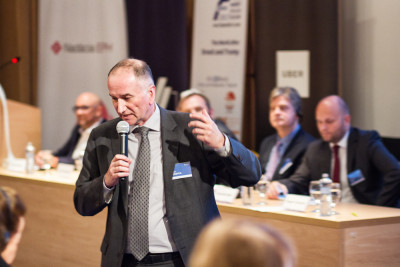 The final speech was delivered by Canadian chargé d’affaires in Slovakia, Mr. John von Kaufmann, who praised the EU-Canadian partnership, as he considers it to be the key for maintaining peace and justice. Furthermore, Mr. von Kaufmann mentioned the EU-Canada Comprehensive Economic and Trade Agreement (CETA) and called it an important step towards better future, hoping that it will serve as an example for other countries. He also highlighted the fact that politicians should pay more attention to the general public opinion and avoid repeating the mistakes from the past.
The final speech was delivered by Canadian chargé d’affaires in Slovakia, Mr. John von Kaufmann, who praised the EU-Canadian partnership, as he considers it to be the key for maintaining peace and justice. Furthermore, Mr. von Kaufmann mentioned the EU-Canada Comprehensive Economic and Trade Agreement (CETA) and called it an important step towards better future, hoping that it will serve as an example for other countries. He also highlighted the fact that politicians should pay more attention to the general public opinion and avoid repeating the mistakes from the past.
The second round of Q&A followed. There were many questions directed at Mr. Štefunko, mainly concerning his stance towards the services provided by the state and regarding the education system. He is convinced that the state services are economically effective in many aspects which is why we should keep financing them. In connection to the education reform, he emphasized the importance of practical skills education and soft skills development, which would improve people’s adaptability to the demands of the real world.
Prof. Weede reacted to the question: “Why not support the freedom of movement, if you support the free market?” by saying that it is not possible to combine the absolute freedom of movement with a strong welfare state, as it creates conflict between the majority population and the recipients of welfare benefits. As an example, prof. Weede mentioned Germany, where the number of immigrants and the costs for the state to accommodate them are already causing trouble, because the countries of origin of many do not have a functional welfare state.
“Compared to the current variant of decision making, wouldn’t it be a good idea to decentralize the political power in Slovakia?” was the next question for Mr. Jurzyca. The main problem here, according to him, is the motivation of municipalities, which will rather accept financial aid from our PM than make the effort to attract investors into the region. The most important issue to tackle with regards to education is to introduce a system of monitoring the results of reformation efforts, thinks Mr. Jurzyca. There is currently no transparent mechanism of evaluating the teachers’ efficiency and quality of their work. Furthermore, the evaluation of students is imperfect as well.
The last speaker was Mr. Federico Fernadez (AEC), who once again emphasized the necessity of promoting the free trade principles and supporting human capital. Mr. Fernandez also mentioned the example of sharing economy, whose services were prohibited in many cities, instead of updating the legislature to the current situation on the market. Moreover, Mr. Fernandez challenged the public not to be fearful of catastrophic worst-case future scenarios, but to look at the best practices which helped combat poverty on a global scale. Finally, Mr. Fernandez thanked INESS for organizing the event as it is regularly one of the best ones in the world tour.
The organization of Free Market Road Show was made possible by the generous help of our partners: Nadácia EPH, Nadácia Tatra banky, Konrad Adenauer Stiftung and UBER. Big thanks goes to our media partners: portal Aktuality.sk, .týždeň weekly, Trend weekly, and denník N. And last but not least, we thank the Austrian Economics Center, the main organizer of the FMRS tour.
Translated by Veronika Fajbíková
Photography by Andrea Melichová



